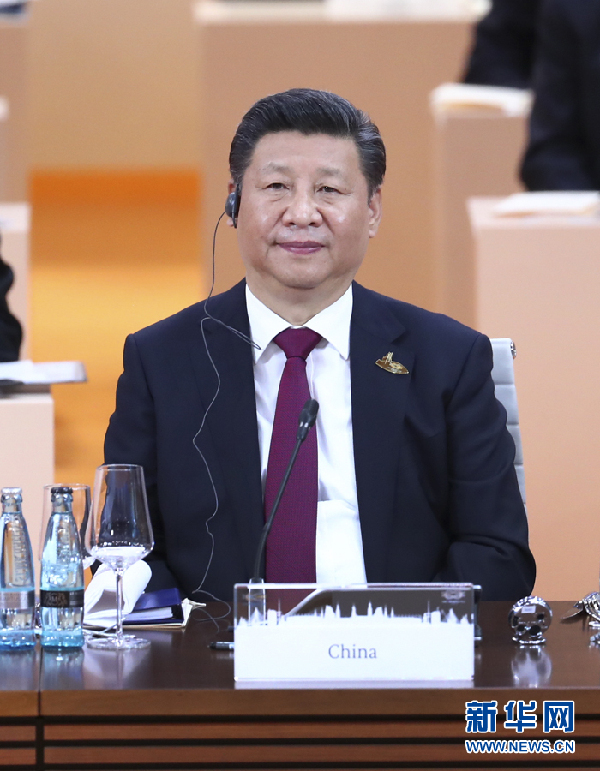當前位置: Language Tips> Focus 專題> 英語學“習”> 治國理政
分享到
黨的十九大報告提出,“推進國際傳播能力建設,講好中國故事,展現真實、立體、全面的中國,提高國家文化軟實力。”
在國際傳播和對外文化交流中,熟悉并順應受眾聆聽習慣是很重要的一點。講中國故事的時候,要了解受眾的文化背景、思維模式、行為習慣、話語體系、關注話題、審美方式等因素,通過他們熟悉和喜聞樂見的事物來傳遞我們的聲音。
這方面,習近平主席就給我們樹立了一個學習的標桿。無論出訪演講,還是在當地媒體發表署名文章,習近平主席總能找到當地人民熟悉的俗語、諺語、名言,或者電影、電視劇來作例子,簡單一兩句話就可以讓對方明白自己想要表達的意思。
今天,我們就一起回顧這些年習近平主席在署名文章和講話中曾經引用過的外國諺語、俗語以及名言,學習講好故事的精髓。
 |
|
7月7日,二十國集團領導人第十二次峰會在德國漢堡舉行。國家主席習近平出席并發表題為《堅持開放包容 推動聯動增長》的重要講話。新華社記者 謝環馳 攝 |
老撾諺語:“一根柴棍燒不成旺火,一根木棍圍不成籬笆。”
【解讀】這句諺語與中國人常說的“眾人拾柴火焰高”是一個意思,大家一起為了共同的目標出力,才能把事情做成。
“習”語原文:
老撾人常說“一根柴棍燒不成旺火,一根木棍圍不成籬笆”,中國人講“眾志成城”、“眾人拾柴火焰高”。我堅信,只要中老彼此信任,攜手合作,必將開創兩國關系更加美好的明天。
As a Lao saying goes, one piece of firewood does not make high flames, and a single wood stick does not make a fence. The Chinese believe that people, if united, are as strong as a fortress, and flame runs high if everyone adds wood to it. I am convinced that as long as our two countries trust each other and work together, we will create an even better future for our bilateral relations.
——2017年11月13日,習近平在老撾媒體發表署名文章
越南俗語:“莫見浪頭高,放下手中槳”。
【解讀】水中行船時,若是因為前方水急浪大就放棄劃槳,最終要么是被浪潮吞噬,要么是被沖回原點。這種時候,只有抓緊手中的槳,繼續奮勇向前,才能攻克難關,駛向終點。
“習”語原文:
中國俗語稱,“艱難困苦,玉汝于成”。越南有句俗語,“莫見浪頭高,放下手中槳”。作為前途相關、命運與共的好鄰居、好朋友、好同志、好伙伴,我們要維護和發展好兩國關系,為各自維護穩定、深化改革、改善民生提供助力,共同推進社會主義事業,促進地區和平穩定和開放發展。
China has a saying, "Adversity makes one stronger, just as polishing makes jade finer." A Vietnamese saying says, "Do not put down your oar just because the waves run high." As good neighbors, friends, comrades and partners whose future is closely interconnected, we need to uphold and further grow our relations, support each other in our endeavors for stability, reform and people's livelihood, jointly advance the cause of socialism and promote regional peace, stability, openness and development.
——2017年11月9日,習近平在越南媒體發表署名文章
德國諺語:一個人的努力是加法,一個團隊的努力是乘法。
【解讀】良好的團隊協作達到的效果就是1+1>2。
“習”語原文:
德國諺語說,一個人的努力是加法,一個團隊的努力是乘法。讓我們攜手合作,推動聯動增長,促進共同繁榮,不斷向著構建人類命運共同體的目標邁進!
A German saying goes to the effect that, "Those who work alone, add; those who work together, multiply." In this spirit, let us work together to promote interconnected growth for shared prosperity and build toward a global community with a shared future.
——2017年7月7日,習近平在二十國集團領導人漢堡峰會上關于世界經濟形勢的講話
阿拉伯諺語:“金字塔是一塊塊石頭壘成的”。
【解讀】將一塊塊石頭層層堆疊建成金字塔,其過程往往極為漫長。這里的“金字塔”也泛指一切神圣偉大的事業,偉大的事業需要一步一個腳印推進。
“習”語原文:
中國古語講:“不積跬步,無以至千里。”阿拉伯諺語說,“金字塔是一塊塊石頭壘成的”。歐洲也有句話:“偉業非一日之功”。“一帶一路”建設是偉大的事業,需要偉大的實踐。讓我們一步一個腳印推進實施,一點一滴抓出成果,造福世界,造福人民!
An ancient Chinese saying goes, "A long journey can be covered only by taking one step at a time". Similarly, there is an Arab proverb which says that the Pyramid was built by piling one stone on another. In Europe, there is also the saying that "Rome wasn't built in a day." The Belt and Road Initiative is a great undertaking which requires dedicated efforts. Let us pursue this initiative step by step and deliver outcome one by one. By doing so, we will bring true benefit to both the world and all our people!
——2017年5月14日,習近平在“一帶一路”國際合作高峰論壇開幕式上的演講
俄羅斯諺語:“通向成功的道路永遠都是曲折坎坷的。”
【解讀】成功不是一帆風順的,但是,只要努力,成功是可以獲得的。
“習”語原文:
我們今天的努力,關系30億金磚國家人民的福祉,也關系整個世界和全人類的前途和未來。俄羅斯有句諺語:“通向成功的道路永遠都是曲折坎坷的。”讓我們踏上征程,攜手建設金磚國家更緊密的伙伴關系,共同開創金磚國家更美好未來!
What we do today bears on the well-being of the three billion people in the BRICS countries as well as on the destiny and future of the whole world and the entire mankind. As a Russian proverb goes, "The road to success is always bumpy and tortuous." So let us embark on this journey together, work hand in hand to build a closer partnership among the BRICS countries and create an even better future for us all.
——2015年7月9日,習近平在金磚國家領導人第七次會晤上的講話
除了民間熟知的俗語和諺語,習近平主席也會用熱門影視劇來幫自己傳遞觀點。
2015年9月訪美期間,在由華盛頓州政府和美國友好組織共同籌備的歡迎晚宴上,習近平談及中國的反腐態勢時表示,中國會進一步加大反腐力度,而且“這和權力斗爭毫無關聯,這和你們在美劇《紙牌屋》里看見的可不同(This has nothing to do with power struggle. It's nothing like what you see in House of Cards)。”
此外,外國名著中的名句也是習近平主席講述中國故事的一個利器,狄更斯、莎士比亞、雨果等名家的名句都曾經出現在他的演講中。
狄更斯:“這是最好的時代,也是最壞的時代。”
【出處】狄更斯的小說《雙城記》(A Tale of Two Cities)
“習”語原文:
“這是最好的時代,也是最壞的時代”,英國文學家狄更斯曾這樣描述工業革命發生后的世界。今天,我們也生活在一個矛盾的世界之中。
“It was the best of times, it was the worst of times.” These are the words used by the English writer Charles Dickens to describe the world after the Industrial Revolution. Today, we also live in a world of contradictions.
——2017年1月17日,習近平在世界經濟論壇2017年年會開幕式上的主旨演講
莎士比亞:“凡是過去,皆為序章。”
【出處】莎士比亞戲劇《暴風雨》(The Tempest),第二幕第一場。這句話表達的意思是,過去發生的一切會成為下一步行動的誘因。
“習”語原文:
莎士比亞說:“凡是過去,皆為序章。”我們今天所處的時代,是以和平與發展為主題的時代,也是各國同舟共濟,攜手共進的時代。
Shakespeare wrote, " What's past, is prologue." We are in an age of pursuing peace and development. It is also an age in which countries meet challenges and forge ahead together.
——2015年10月20日,習近平在英國議會發表講話
雨果:“世界上最寬闊的是海洋,比海洋更寬闊的是天空,比天空更寬闊的是人的胸懷。”
【出處】法國作家雨果的小說《悲慘世界》(Les Misérables)。
“習”語原文:
雨果說,世界上最寬闊的是海洋,比海洋更寬闊的是天空,比天空更寬闊的是人的胸懷。對待不同文明,我們需要比天空更寬闊的胸懷。文明如水,潤物無聲。
Victor Hugo once said, "There is a prospect greater than the sea, and it is the sky; there is a prospect greater than the sky, and it is the human soul." Indeed, we need a mind that is broader than the sky as we approach different civilizations. Civilizations are like water, moistening everything silently.
——2014年3月27日,習近平在聯合國教科文組織總部的演講
(中國日報網英語點津 馬文英)
上一篇 : “四項原則”、“五點主張”、“網絡空間命運共同體”:聽習近平主席說“網事”
下一篇 :
分享到
電話:8610-84883645
傳真:8610-84883500
Email: languagetips@chinadaily.com.cn